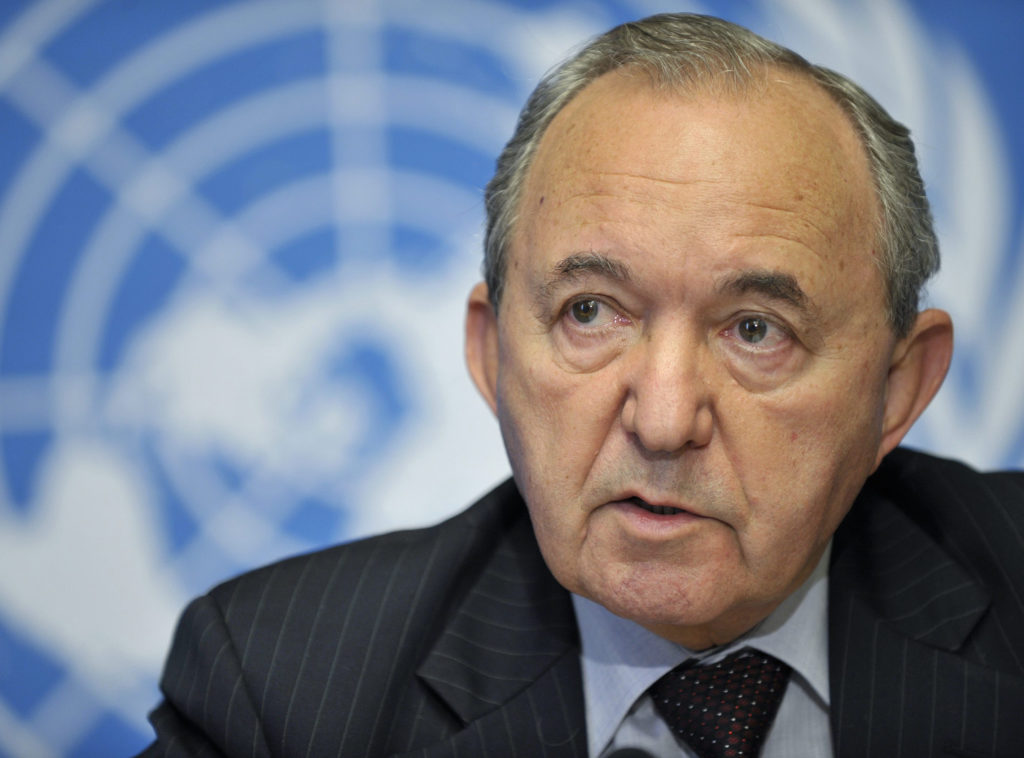Australia/Israel Review
Editorial: A Belated Recantation
Apr 18, 2011 | Colin Rubenstein

Colin Rubenstein
Probably no document in the history of the Arab–Israeli conflict has done more damage to the reputation of Israel, nor contributed more to the international campaign to boycott and delegitimise it, than the Goldstone Report. That is why Justice Goldstone’s mea culpa in a Washington Post op-ed on 1 April was so breathtaking.
Richard Goldstone, chair of the commission which authored the UN Human Rights Council’s (UNHRC) Goldstone Report into the Gaza War of 2008-09, has now conceded that, regarding Israel, “if I had known then what I know now, the Goldstone Report would have been a different document.”
In particular, he now agrees that the most inflammatory and absurd of the report’s conclusions – that Israel deliberately targeted Palestinian civilians “as a matter of policy” – is baseless. He also concedes that Israeli authorities are reasonably investigating every specific allegation of misconduct by its soldiers during the Gaza war. Hamas, by contrast, he points out, has done “nothing.”
Unfortunately, Justice Goldstone’s change of heart cannot undo the massive, irreparable damage he and his co-commissioners originally inflicted through their report. This damage is not only to Israel’s reputation but also to Middle East peace prospects, and to the very notion of a responsible and universal system of international law.
Goldstone now agrees that the UNHRC, which mandated his inquiry, has a “history of bias against Israel [that] cannot be doubted.” This is after all the same UNHRC which included Libya, Egypt and Saudi Arabia as members – and gave them clean bills of human rights health – when it initiated the fact-finding mission. It then completely omitted addressing whatever scant reference there was to Hamas in the Goldstone Report when it was formally adopted a year later. The UNHRC has never condemned the ongoing Hamas rocket and mortar attacks from Gaza on Israeli towns despite repeated Israeli requests for the UN to do so.
The UNHRC’s mandate for Goldstone already declared that Israel, and Israel alone, was guilty of “grave violations”. Two of Justice Goldstone’s three fellow panel members, British academic Christine Chinkin, and Pakistani jurist Hila Jilanu had also publicly declared Israel guilty of war crimes before joining his commission. The third, Irish military officer Desmond Travers, has since indulged in conspiracy theories about “Jewish lobbyists”, made bizarre and false claims about Israeli soldiers executing Irish peacekeepers and claimed that there were “something like two” Hamas rocket attacks on Israel prior to the Gaza conflict (there were in fact 125 rockets and 80 mortars over the previous month alone).
Yet Goldstone continues to criticise Israel for failing to cooperate with his commission. Surely, the fact that the UNHRC has never been able to demonstrate even a semblance of balance regarding the Arab–Israeli conflict made such an Israeli decision all but inevitable.
Notwithstanding Israel’s decision to officially shun the mission, there was ample readily available evidence including publicly issued reports by Israel, NGO reports, witness testimony, and international media stories at the time of his original report for Goldstone to reach the same conclusions that he has now. Instead, true to the UNHRC framework of the commission’s work, Israel was declared guilty on the grounds that it had not disproven the allegations against it.
Israel actually commenced investigating any allegations against its soldiers immediately after the conflict, and has one of the most independent judicial and military investigation review systems in the world. Its track record of punishing soldiers guilty of misconduct is such that the Goldstone Commission’s/UNHRC’s assumption that it is incapable of doing so can only be attributed to the UNHRC’s biased political agenda.
Justice Goldstone’s repudiation of the key elements of his original report should, in fairness, now dramatically undercut efforts by Israel’s critics, including radical NGOs, to paint it as a ‘rogue state’. But it probably will not.
The UNHRC will almost certainly not rescind the report, though it should, even if Goldstone formally requests this, both because of its own biases – it is dominated numerically by the Organisation of the Islamic Conference states – and because the other commissioners have rejected his re-evaluation. Meanwhile, anti-Israel campaigners relying on the report to further their agendas are already publicly dismissing Goldstone’s current views as irrelevant.
Furthermore, the Palestinian Authority is now disastrously pursuing what might be called a “Goldstone strategy”. Refusing to negotiate with Israel on a much-needed two-state conflict resolution, it is instead pursuing a plan to be granted unilateral statehood through the UN – relying on the world body’s permanent anti-Israel majority and ability, as demonstrated by the Goldstone process, to twist facts and procedures to a ridiculous extent to further the Palestinian political cause. This is bad for everyone concerned not only because peace cannot be achieved without genuine negotiations but because any unilateral Palestinian move, without any shared agreement on difficult and contentious issues like refugees and Jerusalem, may well necessitate Israeli political counter-moves and spark a renewal of violence between the parties.
Finally, the Goldstone fiasco is a major setback for international law and the institutions of the UN. The Goldstone Report in effect attempted to establish a legal principle that if terrorist groups operate from a civilian population, it is a war crime to respond in self-defence to their attacks if any civilians may be harmed, as some inevitably always will be. Such a principle enables terrorists to put civilians on both sides in harm’s way, and by creating a completely unworkable rule, damages respect for, and adherence to, international law.
Meanwhile, what serious government would be willing to submit to the totally politicised, corrupt and biased parody of the application of human rights law that UN institutions instigated in the Goldstone case?
Despite Goldstone’s volte-face, the negative repercussions of this fiasco will reverberate for years.
Tags: Israel






